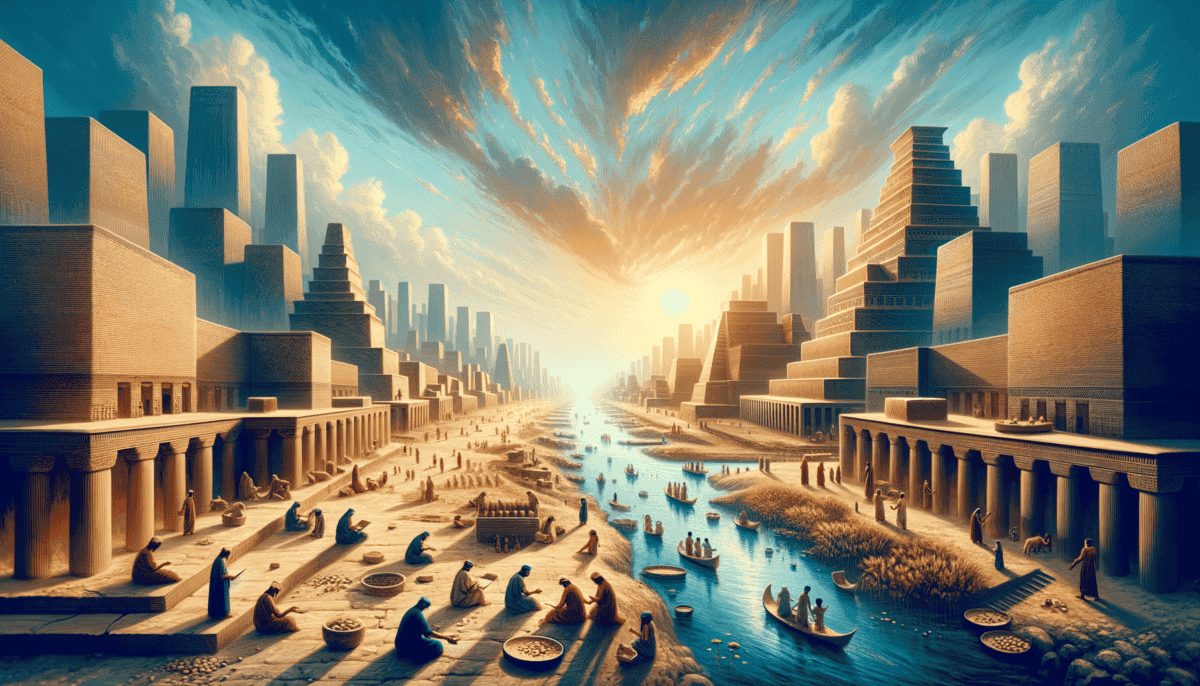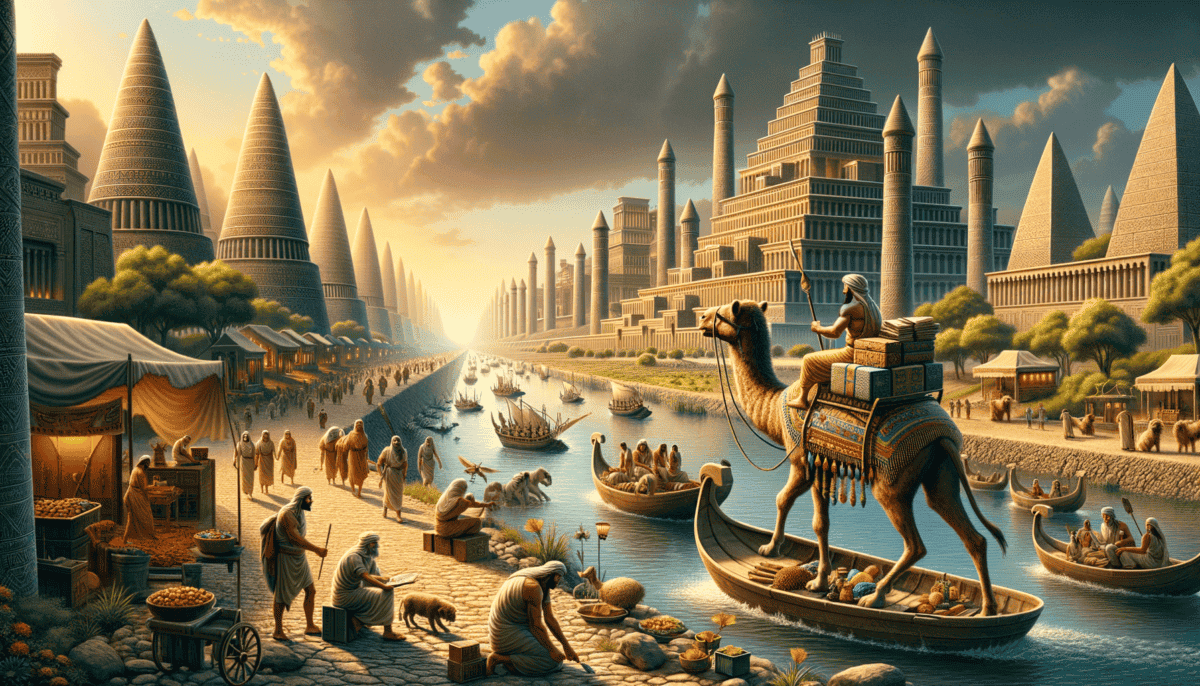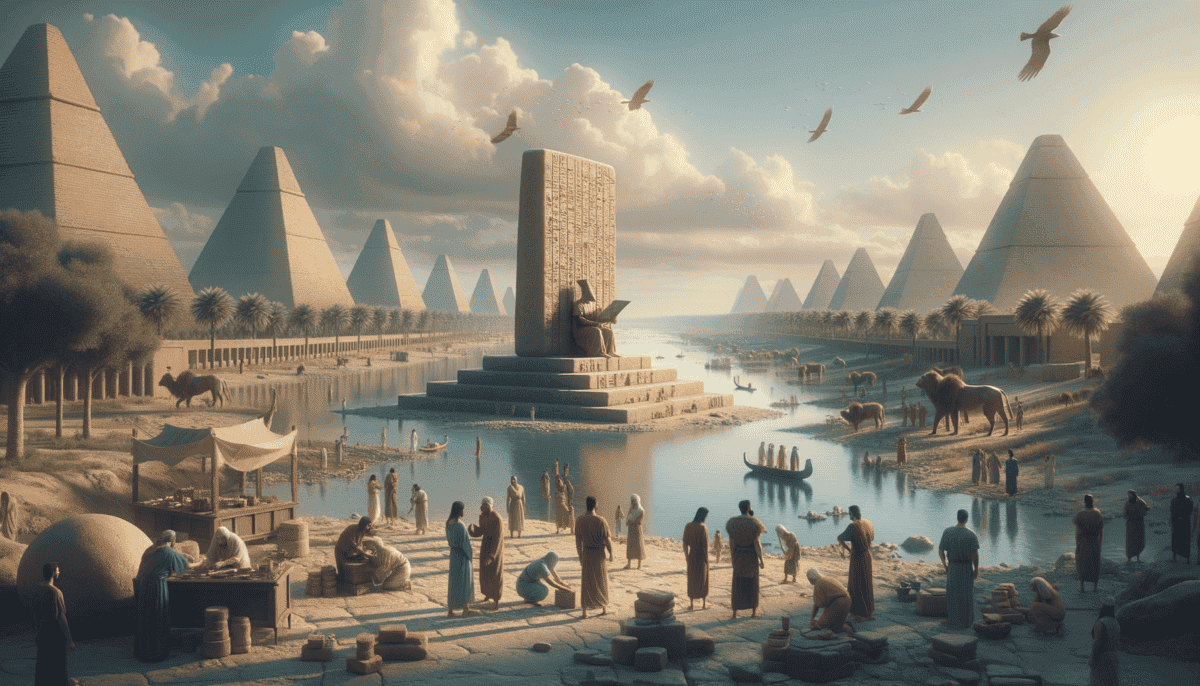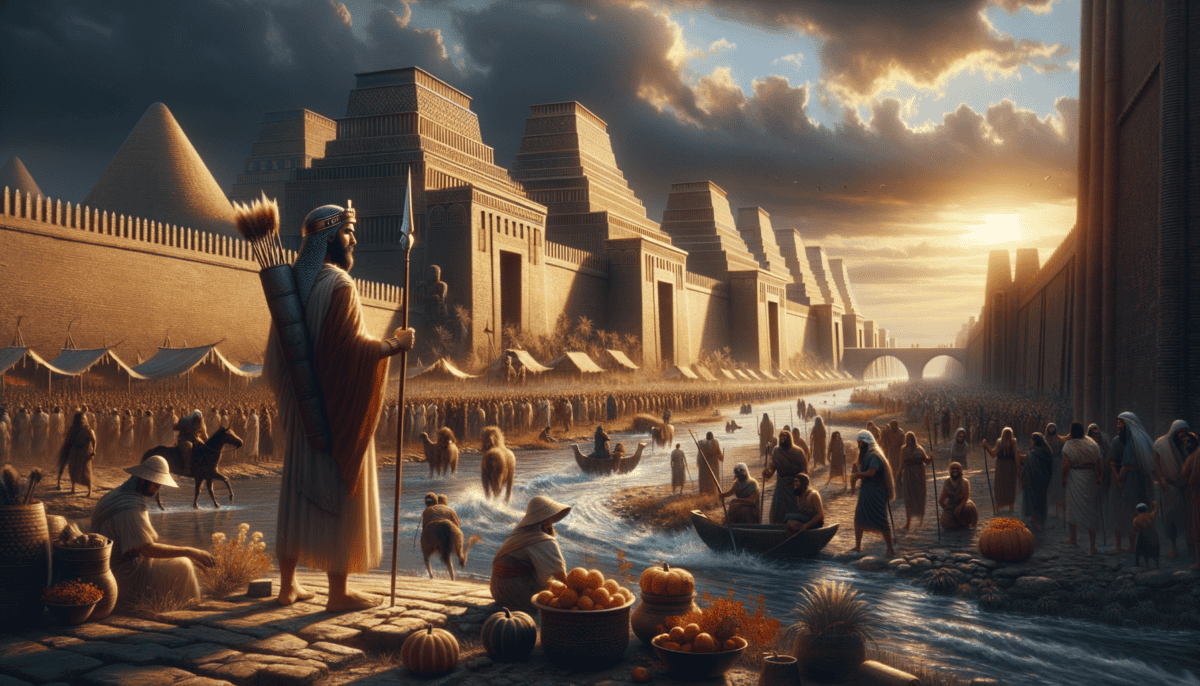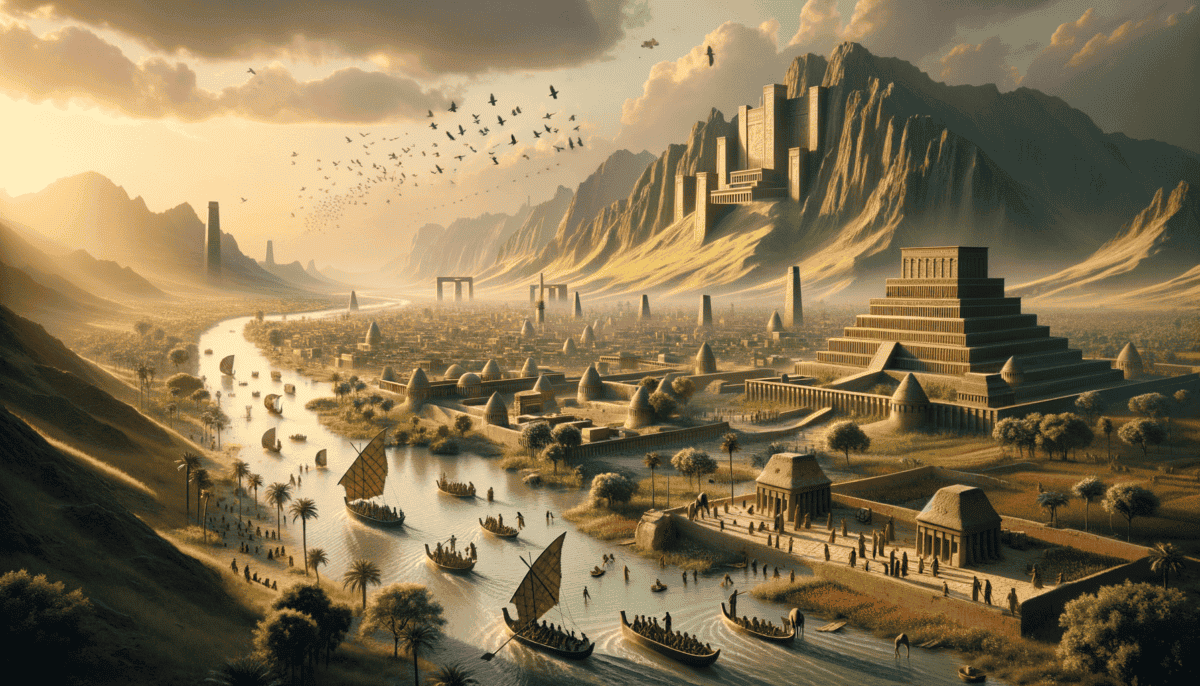The River’s Promise
The hot sun beat down on young Enlil's face as he stood at the edge of his family's farm, watching the mighty Euphrates River flow past. At just ten years old, he already knew how important this river was to everyone in Ur.
"Father, why do we need so much water?" Enlil asked, wiping sweat from his forehead.
His father smiled, pointing to their dry fields. "Without water, nothing grows in our land. The river is life itself."
Enlil looked at the cracked earth beneath his feet. The soil was hard and brown, like the clay tablets he sometimes saw the village scribe using. All around him, other farmers were working hard to dig small ditches that would carry water from the river to their crops.
"It's not easy being a farmer here," his father said, picking up his wooden hoe. "But our people have lived here for thousands of years. We learned to make the desert bloom."
The boy watched as other families worked together to build irrigation channels – long paths for the water to flow through. Some used basic tools made of wood and bronze, while others guided oxen to help move heavy loads.
A Curious Mind
"Look, father!" Enlil pointed excitedly at a clever water wheel someone had built. "Why don't we build something like that?"
His father laughed. "Always full of questions, aren't you? That's good. Questions lead to better ways of doing things."
But Enlil wasn't just interested in farming. His eyes often wandered to the distant city walls of Ur, where traders and travelers brought news from far-away places. He could see the great ziggurat – a massive temple that reached toward the sky like a giant staircase.
“What’s beyond those walls?” he whispered to himself. “What other wonders are out there?”
That evening, as the family gathered for dinner in their modest mud-brick house, Enlil's mother noticed his distant look.
"What's on your mind, little one?" she asked, serving him some barley bread.
"I want to know everything about our world," Enlil replied. "How did we learn to grow food in the desert? Who built the first cities? What's happening in other places along the river?"
His older sister giggled. "You ask more questions than a flock of chattering birds! "
But their father raised his hand. "The gods gave us curious minds for a reason. Maybe you'll do more than just work the fields, my son."
The First Challenge
The next morning brought bad news. The irrigation channel they had spent weeks building had partially collapsed during the night. Without it, their crops would die in the hot sun.
"We must fix it quickly," Father announced. "Every moment without water puts our harvest at risk."
Enlil watched as neighbors came running to help. Some brought tools, others brought food for the workers. Even the children helped by carrying water in clay pots.
As they worked to repair the channel, Enlil had an idea. He noticed how the collapsed section was always in the same place where the ground sloped sharply.
"What if we built small steps in the channel?" he suggested. "Like the ziggurat, but tiny. The water would flow more slowly and not wash away the dirt."
The adults stopped and looked at him. Then at each other. His father's face broke into a proud smile.
"Out of the mouths of children often comes wisdom," said one of the elders. "Let's try it."
They rebuilt the channel with small stone steps, just as Enlil had suggested. When they finally let the water flow, it worked perfectly! The water moved more slowly and didn't damage the channels.
That night, as the stars came out over the ancient city of Ur, Enlil lay on the roof of his house, thinking about the day's events. He had helped solve a problem, but he knew there was so much more to learn.
In the distance, he could hear the sounds of the city – merchants closing their shops, priests chanting in the temple, and travelers arriving with their caravans. Tomorrow would bring new challenges and new chances to learn.
His eyes grew heavy as he wondered what adventures awaited him in this land between two rivers, this place called Mesopotamia.
Learning the Sacred Marks
The sun had barely risen when Enlil rushed through the narrow streets of Ur. His heart pounded with excitement. Today was his first day as an apprentice to Zababa, the village scribe!
“Don’t drop the clay tablets!” his mother had called after him. In his bag, he carried carefully wrapped tablets, smooth and ready for writing.
Zababa’s workshop was a small room near the temple. Inside, clay tablets covered every surface. Some had dried completely, while others were still soft and ready for writing.
“Welcome, young one,” Zababa said with a kind smile. “Are you ready to learn the sacred art of writing?”
Enlil nodded eagerly. “Yes, master Zababa! But… my father thinks I should be working in the fields instead.”
The First Lesson
Zababa handed Enlil a wooden stylus – a special tool for writing. “Watch carefully,” he said, pressing the tool into a soft clay tablet. The mark looked like a tiny wedge.
“This is how we begin,” Zababa explained. “Each mark has a meaning. Together, they tell stories, keep records, and help us remember important things.”
Enlil tried to copy the mark. His first attempt looked more like a squashed bug than a proper wedge.
“Don’t worry,” Zababa laughed. “I’ve been doing this for thirty years. You’ll get better with practice.”
A Different Kind of Farming
Days turned into weeks. Enlil’s fingers grew sore from pressing marks into clay, but he didn’t mind. Each new symbol he learned felt like unlocking a secret.
One morning, his father visited the workshop. “How is my son doing?” he asked Zababa.
“He has a gift,” Zababa replied. “See these tablets? He wrote them himself.”
Enlil held his breath as his father examined the tablets. They showed lists of grain storage, trading records, and even a short story about the gods.
His father’s stern face softened. “Perhaps there is more than one way to serve our community,” he said thoughtfully.
The Big Test
One busy market day, a merchant arrived with valuable goods from far away. He needed someone to record his trades quickly.
“My regular scribe is sick,” the merchant said worriedly. “Who can help?”
Zababa looked at Enlil and nodded. “Show us what you’ve learned, young one.”
Enlil’s hands shook as he prepared his tablet. The merchant spoke quickly, listing items: “Twenty measures of grain, five copper tools, three fine wool blankets…”
Working carefully but quickly, Enlil pressed the marks into the clay. Other people gathered to watch the young apprentice at work.
A New Understanding
When he finished, Zababa checked his work. A proud smile spread across his face. “Perfect! Every mark exactly right.”
The merchant was so pleased he gave Enlil a small copper ring as a reward. But the real reward was seeing how writing could help people.
“Now I understand,” Enlil said to Zababa later. “Writing isn’t just making marks in clay. It’s about connecting people and keeping memories alive.”
That evening, walking home with his copper ring, Enlil saw farmers returning from their fields. He realized that just as they grew food to feed bodies, he was learning to feed minds with knowledge. Both were important.
As he practiced his writing that night by candlelight, Enlil wondered about all the stories waiting to be told, all the knowledge waiting to be shared. His fingers might be tired, but his mind was full of exciting possibilities. ✨
Through his window, he could see the great ziggurat, its shadow long in the setting sun. Somewhere out there, beyond the city walls, countless more stories waited to be discovered and written down.
The Merchant’s Caravan
The morning air buzzed with excitement as a long line of traders entered Ur. Camels swayed under heavy loads, and wooden wheels creaked along the dusty road. Enlil watched in wonder as the merchant caravan rolled through the city gates.
“Look at all those wonderful things!” Enlil exclaimed, pointing at the colorful fabrics and shiny metal tools hanging from the camels’ backs.
Zababa placed a hand on Enlil’s shoulder. “How would you like to join them on their next journey?”
A Big Decision
Enlil’s eyes grew wide. “Really? But what about my writing lessons?”
“The best writers learn from what they see,” Zababa smiled. “Besides, they need someone who can write down their trades. You’re ready.”
“Think of it as your biggest lesson yet,” Zababa added. “You’ll see places you’ve only written about!”
That night, Enlil could hardly sleep. He would travel to famous cities like Uruk and Akkad!
The Journey Begins
Early the next morning, Enlil joined the merchants. The lead trader, Dumuzi, gave him a small donkey to ride.
“First stop, Uruk!” Dumuzi announced. “Three days of travel ahead!”
As they left Ur behind, Enlil watched his city shrink until it disappeared. His adventure had begun!
Life on the Road
Traveling with merchants was exciting! They told stories around campfires at night. Enlil learned how different cities traded different things:
- Ur was famous for wool
- Uruk made the best pottery
- Akkad had special metal tools ⚒️
Dumuzi taught Enlil about the clever ways they moved heavy things. “See these wheels?” he said, patting a cart. “They make moving big loads much easier!”
The Great City of Uruk
When they reached Uruk, Enlil gasped. The city walls were even taller than Ur’s! Inside, the streets bustled with people speaking different languages.
“Quick, Enlil!” Dumuzi called. “Write down this trade – ten copper tools for twenty clay pots!”
Enlil’s fingers flew across his clay tablet, pressing the marks he’d learned. Other merchants watched with approval.
River Journey to Akkad
The next part of their journey was by boat! They loaded their goods onto a wide wooden ship.
“The river is like a water road,” explained the boat captain. “It connects all our cities.”
Enlil watched in amazement as the sailors used long poles to push the boat upstream. He wrote everything down in his tablets – how they steered, how they avoided shallow spots, how they used the wind.
New Friends, New Ideas
In each city, Enlil met different people. Some wore clothes he’d never seen before. Others ate strange but tasty foods. Everyone had something to teach him.
A potter in Uruk showed him how to make strong clay vessels. In Akkad, a metalworker let him watch as he turned hot metal into shiny tools.
“See?” said Dumuzi one evening. “Trading isn’t just about buying and selling. It’s about sharing ideas too!”
Coming Home Changed
When Enlil finally returned to Ur, he had filled many tablets with his writings. But the most important things he’d learned couldn’t be written down:
He now knew how big the world was. He understood how different people worked together to make life better. Most importantly, he saw how writing connected everyone.
That night, sitting in Zababa’s workshop, Enlil smiled as he wrote about his journey. Outside, he could hear another merchant caravan arriving, bringing new adventures with them. The world was full of wonderful things to learn, and he couldn’t wait to discover more!
The Law Stones of Babylon
The bustling streets of Babylon stretched before Enlil like a maze of wonders. Tall buildings made of sun-baked bricks reached toward the sky. The smell of fresh bread and spices filled the air.
“Look there!” Dumuzi pointed to a huge crowd gathering in the city center. “King Hammurabi is sharing his new laws today.”
The King’s Big Idea
Enlil squeezed through the crowd with his writing tools. In the middle stood a tall black stone covered in cuneiform writing. King Hammurabi, wearing a fancy robe and crown, stood next to it.
“These laws will make life fair for everyone,” the king announced. “Rich or poor, strong or weak – everyone must follow the same rules!”
Enlil’s eyes grew wide. He had never seen so many laws written in one place!
Learning the Laws
“Can you read what it says?” asked a small girl next to Enlil.
“I can!” Enlil smiled proudly. He began to read some of the simpler laws:
- Be honest in trade
- Help your neighbors
- Farmers must take care of their fields
- Teachers must be kind to students
A Special Job
A royal scribe noticed Enlil reading the laws. “Young man, would you like to help copy these laws? We need to send them to other cities.”
Writing with Care
For the next few days, Enlil worked with other scribes. They carefully copied each law onto clay tablets.
“Every mark must be perfect,” the head scribe said. “These laws will help people live better lives.”
Enlil thought about his home in Ur. “Will these laws help my family too?”
“Yes,” smiled the scribe. “That’s why we’re making copies – so everyone knows the rules and can be treated fairly.”
Seeing Justice in Action
One morning, Enlil watched as two farmers came to the city judge. They were arguing about water for their fields.
The judge looked at Hammurabi’s laws and made a fair decision. Both farmers left happy! ⚖️
“See?” Dumuzi said. “Good laws help people solve problems without fighting.”
Making Things Better
As days passed, Enlil saw how the laws made life in Babylon more peaceful. People followed the rules because they were fair to everyone.
He wrote in his personal tablet: “When everyone knows the rules and follows them, life is better for all!”
Dreams of Home
At night, Enlil thought about his family and friends in Ur. He imagined sharing everything he learned about laws and justice.
“Maybe someday,” he whispered to himself, “I can help make rules that are fair for everyone in Ur too.”
A New Understanding
Before leaving Babylon, Enlil took one last look at the great stone of laws. He now understood that writing wasn’t just for counting trade goods or telling stories.
Writing could make life better for everyone. It could help people be fair and kind to each other.
As he packed his tablets carefully in his bag, Enlil felt proud. He was part of something important – something that would help people for many years to come! ⭐
Battle for Babylon
The peaceful morning in Babylon suddenly changed. Loud horns blasted through the air!
The City Gets Ready
“Everyone to the walls!” shouted the city guards. People ran in all directions. Some carried water, others grabbed weapons.
Enlil’s heart beat fast. “What can I do to help?” he asked Dumuzi.
“You can read and write! We need someone to carry messages between the city defenders.”
Being Brave
Enlil nodded bravely. He grabbed his clay tablets and stylus. The city needed him!
Smart Defense
The soldiers had clever ways to protect Babylon:
- Big walls made of strong bricks
- Deep ditches filled with water
- Towers where archers could shoot arrows
- Gates made of heavy wood and metal
Working Together
“Look how everyone helps!” Enlil wrote in his tablet. Women brought food to the soldiers. Children carried water. Old people took care of the injured.
“When we work together, we are strong!” smiled a guard.
The Big Fight
The Assyrian army tried to break through the city walls. They used big wooden rams and tall ladders.
But the people of Babylon fought back! They poured hot oil and threw rocks at the attackers.
A Clever Plan
“The enemy is trying to cross the river!” Enlil heard someone shout.
He quickly wrote this message and ran it to the commander. The soldiers rushed to protect the river gate.
“Your fast message saved us!” the commander patted Enlil’s shoulder.
Victory Dance
After three days of fighting, the Assyrian army gave up! They couldn’t break through Babylon’s strong walls.
The whole city celebrated! People sang songs and danced in the streets.
Writing History
“Will you write about what happened?” asked the head scribe.
Enlil nodded. He carefully wrote about how everyone worked together to save the city.
“Future children will read about how brave Babylon was!” he said proudly.
Lessons Learned
That night, Enlil thought about everything he saw. He learned that being strong isn’t just about fighting.
It’s about people helping each other. It’s about being smart and brave. It’s about working together!
As he fell asleep, Enlil smiled. He wasn’t just a messenger today. He was a hero who helped save Babylon! ⭐
Legacy of Wisdom
The morning sun sparkled over Babylon. Enlil sat on his favorite spot near the great ziggurat, writing on his clay tablet.
Looking Back
“Dear tablet,” Enlil wrote, “I have learned so much since leaving my little farm by the river.”
He remembered his first days learning to write, the exciting caravan journey, and the big battle. Each memory made him smile.
Teaching Others
“Can you teach me to write?” asked a small girl named Inanna.
Enlil’s eyes lit up. “Of course! Writing is like magic – it lets us share stories with people far away and even with people who aren’t born yet!”
Building Dreams
Enlil worked with the city builders too. He used his knowledge to help design better:
- Water channels for farms
- Strong houses from bricks
- Better wheels for carts
- New tools for farming
Special Visitor
One day, a familiar face appeared – it was Dumuzi, the merchant who first brought him to Babylon!
“Look at you now,” Dumuzi smiled. “From a curious farm boy to a respected teacher!”
Big Changes
Enlil showed Dumuzi around the city. “See these new gardens? And look at our school for young scribes!”
“You’ve helped make Babylon even better,” Dumuzi said proudly.
Family Reunion
Best of all, Enlil’s parents came to visit. They couldn’t believe their eyes!
“Our son,” his mother hugged him, “you’ve done so much good here.”
Future Dreams
“What’s next?” asked Inanna one day.
Enlil looked at the busy city streets. “We keep learning, building, and making things better. There’s always something new to discover!”
The Greatest Gift
That evening, Enlil wrote his most important message yet:
“The greatest power isn’t in swords or walls. It’s in what we learn and share with others. Every person can make the world better, one small step at a time.” ⭐
Forever Story
As the stars came out, Enlil placed his tablet carefully with others in the city library.
His story would stay there, waiting for future children to read about a brave young boy who helped make Mesopotamia great.
And somewhere, right now, another curious child might be starting their own amazing journey!


